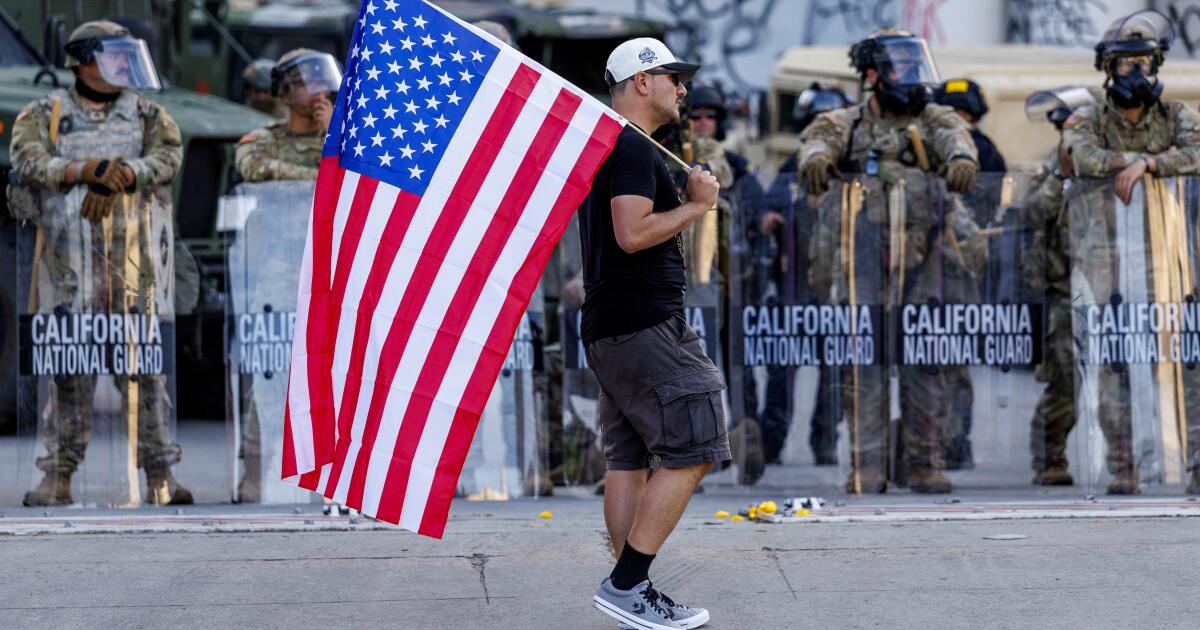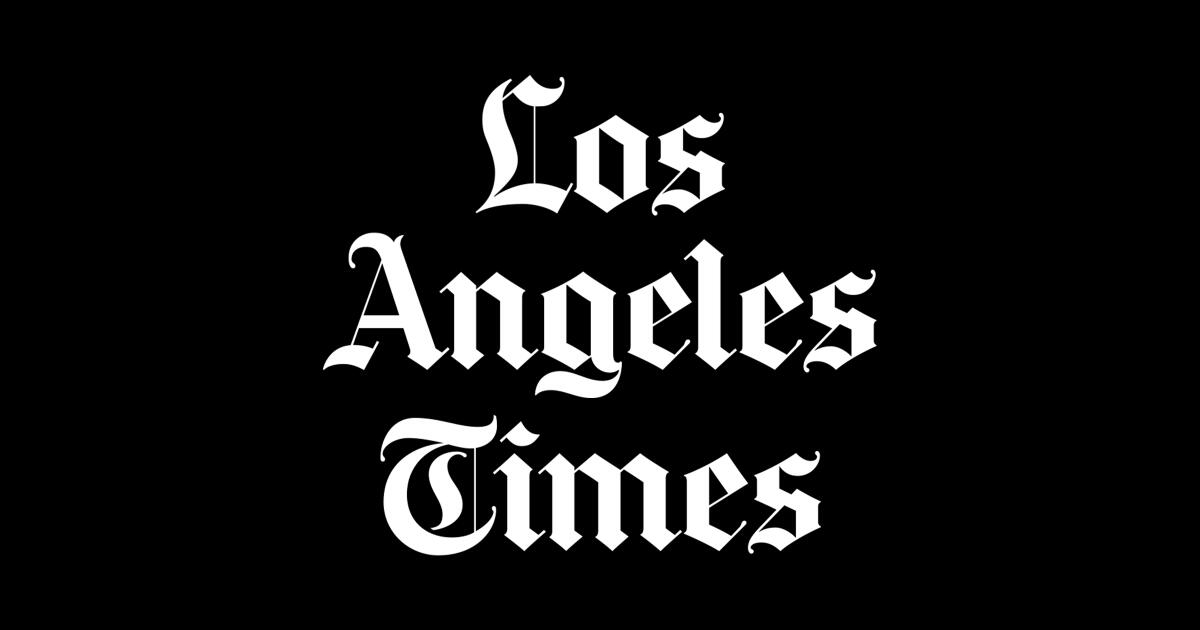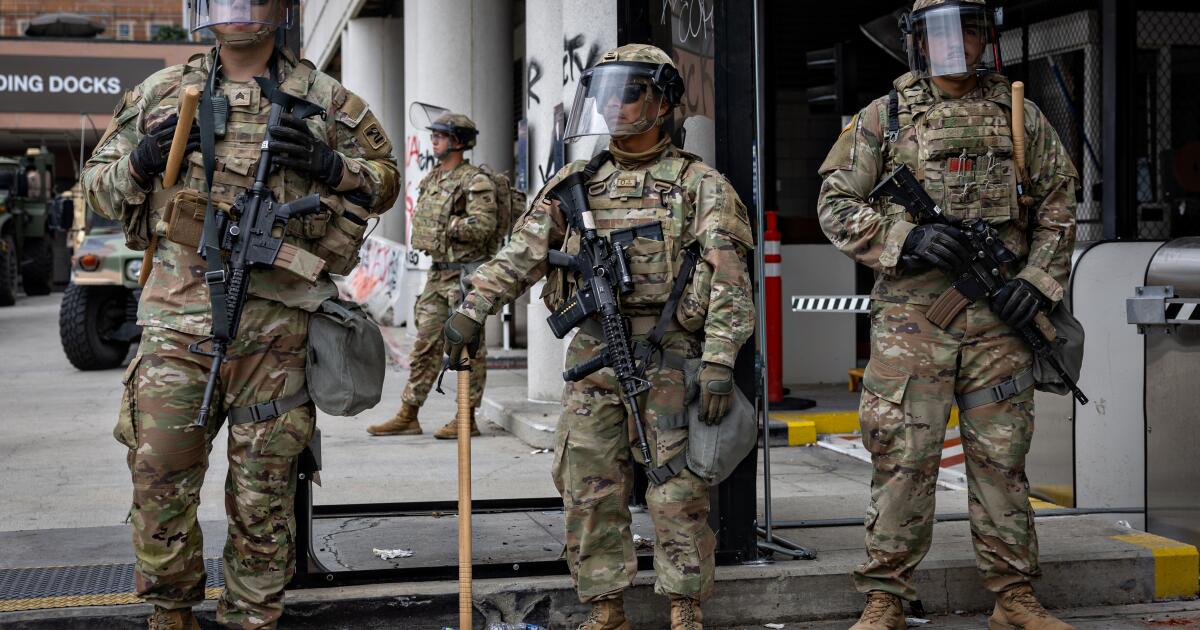Despite a stinging rebuke from a federal judge Thursday, military forces deployed in Los Angeles will remain under presidential control through the weekend, setting up a series of high-stakes showdowns.
On the streets of Los Angeles, protesters will continue to be met with platoons of armed soldiers. State and local officials remain in open conflict with the president. And in the courts, Trump administration lawyers are digging deep into case law in search of archaic statutes that can be cited to justify the ongoing federal crackdown — including constitutional maneuvers invented to enforce the Fugitive Slave Act of 1850.
Many legal scholars say the current battle over Los Angeles is a test case for powers the White House has long hoped to wield — not just squelching protest or big-footing blue state leaders, but stretching presidential authority to its legal limit.
“A lot rides on what happens this weekend,” said Christopher Mirasola, a professor at the University of Houston Law Center.
By staying the order that would have delivered control of most troops back to California leaders until after the weekend, the 9th Circuit Court of Appeals left the Trump administration in command of thousands of National Guard troops and hundreds of Marines ahead of the nationwide “No Kings” protests planned for Saturday.
The Trump administration claimed in court that it had the authority to deploy troops to L.A. due to protesters preventing ICE agents from arresting and deporting unauthorized immigrants — and because demonstrations downtown amounted to “rebellion against the authority of the Government of the United States.”
But U.S. District Court Judge Charles Breyer of San Francisco wrote Thursday that Trump had steamrolled state leaders when he federalized California’s troops and deployed them against protesters.
“His actions were illegal — both exceeding the scope of his statutory authority and violating the Tenth Amendment to the United States Constitution,” Breyer wrote.
While ICE “was not able to detain as many people as Defendants believe it could have,” it was still able to uphold U.S. immigration law without the military’s help, Breyer ruled. A few belligerents among thousands of peaceful protesters did not make an insurrection, he added.
“The idea that protesters can so quickly cross the line between protected conduct and ‘rebellion against the authority of the Government of the United States’ is untenable and dangerous,” the judge wrote.
The 9th Circuit stayed Breyer’s ruling hours after he issued a temporary restraining order that would have allowed California leaders to withdraw the National Guard soldiers from L.A.
The pause will remain in effect until at least Tuesday when a three-judge panel — made up of two appointed by President Trump and one by former President Biden — will hear arguments over whether the troops can remain under federal direction.
The court battle has drawn on precedents that stretch back to the foundation of the country, offering starkly contrasting visions of federal authority and states’ rights.
The last time the president federalized the National Guard over the objections of a state governor was in 1965 when President Lyndon B. Johnson sent troops to protect Martin Luther King Jr. and the Selma to Montgomery March in defiance of then-Gov. George Wallace.
But sending troops in to assist ICE has less in common with Johnson’s move than it does with President Millard Fillmore’s actions a century earlier, Mirasola said. Beginning in 1850, the Houston law professor said, Fillmore sent troops to accompany federal marshals seeking to apprehend escaped slaves who had fled north.
Trump’s arguments to deploy the National Guard and Marines in support of federal immigration enforcement efforts rely on the same principle, drawn from the “take care” clause of Article II of the Constitution, Mirasola said. He noted that anger over the military’s repeated clashes with civilians helped stoke the flames that led to the Civil War.
“Much of the population actively opposed enforcement of the Fugitive Slave Act,” the professor said.
Some analysts believe Trump strategically chose immigration as the issue through which to advance his version of the so-called “unitary executive theory,” a legal doctrine that says the legislature has no power and the judiciary has no right to interfere with how the president wields control of the executive branch.
“It’s not a coincidence that we’re seeing immigration be the flash point,” said Ming Hsu Chen, a professor at the UCSF Law School. “Someone who wants to exert strong federal power over immigration would see L.A. as a highly symbolic place, a ground zero to show their authority.”
Chen, who heads the Race, Immigration, Citizenship, and Equality Program at UCSF Law, said it’s clear Trump and his advisers have a “vision of how ICE can be emboldened.”
“He’s putting that on steroids,” Chen said. “He’s folding together many different kinds of excesses of executive power as though they were the same thing.”
Some experts point out that Judge Breyer’s order is limited only to California, which means that until it’s fully litigated — a process that can drag on for weeks or months — the president may attempt similar moves elsewhere.
“The president could try the same thing in another jurisdiction,” said Elizabeth Goitein, senior director of the Liberty and National Security Program at NYU’s Brennan Center for Justice.
“President Trump’s memorandum to deploy troops in Los Angeles made it very clear he thinks it’s appropriate … wherever protests are occurring,” Goitein said. “He certainly seems to think that even peaceful protests can be met with force.”
Experts said Breyer’s ruling set a high bar for what may be considered “rebellion” under the law, making it harder — if it is allowed to stand on appeal — for the administration to credibly claim one is afoot in L.A.
“It’s hard to imagine that whatever we see over the weekend is going to be an organized, armed attempt to overthrow the government,” Goitein said.
The Trump administration, meanwhile, hasn’t budged from its insistence that extreme measures are needed to restore order and protect federal agents as they go about their work.
“The rioters will not stop or slow ICE down from arresting criminal illegal aliens,” the Department of Homeland Security said in a news release this week, which included mugshots of several alleged criminals who had been arrested. “Murderers, pedophiles, and drug traffickers. These are the types of criminal illegal aliens that rioters are fighting to protect.”
Even after the 9th Circuit decision, the issue could still be headed to the Supreme Court. Some legal scholars fear Trump might defy the court if he keeps losing. Others say he may be content with the havoc wrought while doomed cases wend their way through the justice system.
“It’s a strange thing for me to say as a law professor that maybe the law doesn’t matter,” Chen said. “I don’t know that [Trump] particularly cares that he’s doing something illegal.”
Times staff writer Sandra McDonald contributed to this report.


